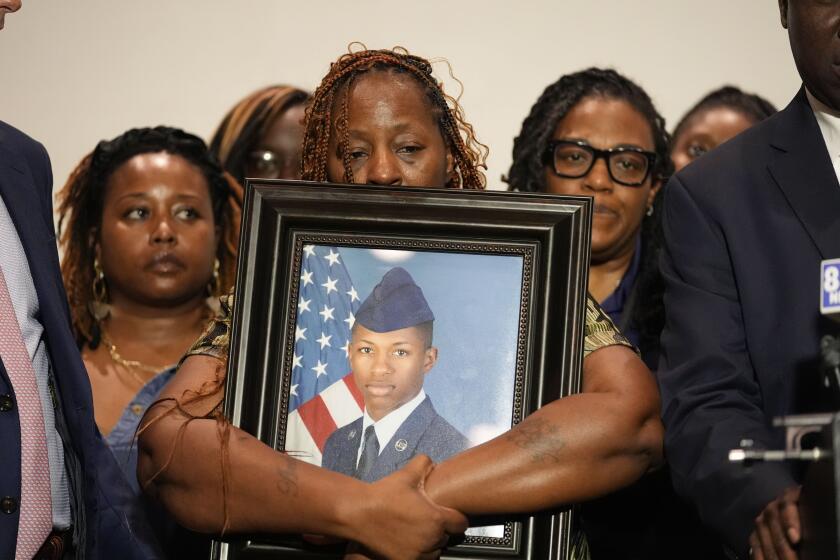Dissidents in Yugoslavia Silenced by Fear
Despite some stirrings of criticism against Yugoslav President Slobodan Milosevic in the capital, supporters of democratic change in Yugoslavia said Tuesday that they are living under a blanket of fear that blocks any kind of mass protests.
Recent statements by Yugoslav Deputy Prime Minister Vuk Draskovic calling on the government to tell its people “the truth” about the situation they face have been described by NATO officials as the first signs of a crack in the unity of Milosevic’s regime.
A political analyst normally based in the capital, Belgrade, but who is now living abroad said that in conversations by telephone and through e-mail with friends back home, he “detected a sense of relief” after Draskovic spoke out, because “at least a few people are saying sensible things in public.”
“But I wouldn’t be too optimistic, because Milosevic still has all the instruments of power,” the analyst added. “People are scared, people are worried, and I think rightly so. I’m receiving three or four times a day advice not to even think of coming back. The fear is palpable, and I think it’s justified.”
Jiri Dienstbier, a U.N. human rights representative, said he met Tuesday with students from Belgrade who had fled to Podgorica because of fear they “might be persecuted” for their pro-democracy activities. The reformist government in Podgorica, the capital of Montenegro, is controlled by Western-oriented leaders opposed to Milosevic’s policies. Montenegro and the dominant Serbia together form Yugoslavia.
“Some of our friends . . . are hiding in Belgrade, sleeping in different places every night,” one of the students, who asked to be identified only as Rastko, said in an interview. Now, however, “you cannot be away from your home more than 24 hours--after that, the police have a right to arrest you,” he said.
“There are such things as blacklists--people who were opposed to Milosevic for a long time,” he added. “They were forced to check in with the police every day, be questioned for hours, things like that.”
Special conscription teams “find different political enemies of Slobodan Milosevic and try to bring them into the army in Kosovo,” said a student who identified himself as Sasa. “That is one of the most dangerous things.”
Rastko described the mood among democratic activists in Belgrade, which is also the Serbian capital, as “total despair.”
Milosevic is rapidly beefing up his ability to suppress dissent, said people familiar with the situation.
“Almost every day, there are new regulations” imposed under Belgrade’s official state of war, Barbara Davis, the United Nations’ top human rights representative in Yugoslavia, told a news conference here. These include rules on identity documents and on reporting one’s location after absences from home of more than 24 hours, she said.
Describing the same general tightening, a journalist who fled Belgrade after the NATO bombing began March 24 and is now living outside the country said that “an article which two months ago would cause me some problems with the authorities and the prospect of maybe two months in prison would now cost me 20 years to life, and possibly execution.”
“Police have unlimited power,” he said. “The judiciary doesn’t meddle in police business at all.”
The journalist said that people who had been active in the fight for democracy now are afraid of NATO bombs, of repression by Milosevic and of rumored contamination of Belgrade’s water supply by chemicals released in factory bombings.
“You combine these three fears: that NATO’s going to kill you, that Slobo is going to kill you and that the environment is going to kill you,” he said. “And then we hear [British Prime Minister] Tony Blair and [Secretary of State] Madeleine Albright say: ‘We don’t want to hurt the Serbian people. It’s Slobodan Milosevic we’re after.’ . . . People like myself are now being targeted by both Milosevic and NATO.
“As long as NATO is bombing, everyone is lying low and no one is going to rebel against the government,” the journalist said.
Milosevic is eliminating the already feeble legal protections that used to exist in Yugoslavia so that “his hands will be free . . . when he no longer has popular support,” the journalist added.
Up to now, he said, “only a few people have disappeared . . . [but] I have no doubt at all it will start happening in the future.
“I was always trying to fight the regime within some [legal] framework,” the journalist added. “There’s no framework anymore. The government has the force. The people have no force. There’s no legal system--there’s just unlimited powers of the government. There’s nothing you can do, and NATO is bombing you from the sky.”
The journalist said the plight of democracy activists still in Belgrade has been worsened because officials of the North Atlantic Treaty Organization countries tend to describe anyone who opposes Milosevic as an ally of NATO.
“Whatever I say against Milosevic in Belgrade will be interpreted at tomorrow’s NATO press briefing as ‘This is our guy in Belgrade,’ ” he complained. “What am I supposed to do? And when I am executed, he won’t be able to pronounce my name. . . . I don’t want to die to prove that Milosevic is an unbearable person--and tomorrow they make a deal with him.”
More to Read
Start your day right
Sign up for Essential California for news, features and recommendations from the L.A. Times and beyond in your inbox six days a week.
You may occasionally receive promotional content from the Los Angeles Times.






